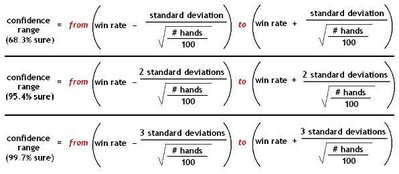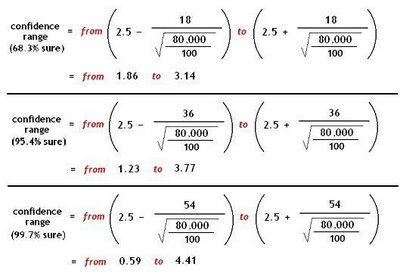Table #2 was a different story.
On the very first hand I picked up

 in the big blind. A couple of players limped, then the button raised. We’re lookin’ at a family pot here, I estimate, and so call the raise. Five of us end up seeing the flop --
in the big blind. A couple of players limped, then the button raised. We’re lookin’ at a family pot here, I estimate, and so call the raise. Five of us end up seeing the flop -- 

 . I end up check-raising the button & we eventually cap it (with the small blind coming along just for funsies). That makes $11 in the pot when the turn comes
. I end up check-raising the button & we eventually cap it (with the small blind coming along just for funsies). That makes $11 in the pot when the turn comes  . Sweet sassy molassey. I bet out this time, and both players call. The river is the
. Sweet sassy molassey. I bet out this time, and both players call. The river is the  . I again bet, and the button’s raise confirms for me what I was already thinking -- big slick. The two of us end up capping it (the small blind finally bailed) and he shows me
. I again bet, and the button’s raise confirms for me what I was already thinking -- big slick. The two of us end up capping it (the small blind finally bailed) and he shows me 
 .
. Argh. $21 pot lost to a two-outer. Oh well, it happens. I took it well, offering a meek “gh” and engaging in some kind-hearted banter with the table about the unlikelihood of the hand turning out the way it did. I steadily worked my way back from the quick $8 hole I had dug, getting into the black briefly at that table before falling back down to about a $3 deficit. Then came a hand where I was UTG and dealt

 . I limped, then (along with two other players) ended up calling a late position raiser -- I’ll call him STUMPY. So four of us were there to see (what was for me) a made-to-order flop:
. I limped, then (along with two other players) ended up calling a late position raiser -- I’ll call him STUMPY. So four of us were there to see (what was for me) a made-to-order flop: 

 .
.It checked to me and I bet out. I generally like to push flopped straights -- especially Broadway. Typically players (in this game, at this limit) rarely believe in flopped straights or flushes and thus will give you action, especially if they’ve paired high cards (as I expected someone did here). I also have to protect, of course. STUMPY raised and the small blind -- 23SKIDOO -- called the two bets. I might’ve kept pushing here, but figuring I wasn’t going to lose either player I just called ($7.50 in the pot).
[EDIT (added 12/3/06): As usual, I've chosen pseudonyms for my opponents here; please don’t mistake this here fellow for the “real” 23skidoo who inhabits our poker blogosphere (see comments).]
Then came the turn, the
 . I feared the boat, but bet out anyway to see what was what. This time STUMPY (the preflop raiser) just called, but 23SKIDOO check-raised. Now I’d already seen ol’ 23SKIDOO preraising with any two high cards, so I was mostly convinced from the preflop action that he didn’t have the boat (though likely did make trips here). So I pushed, he pushed back, and STUMPY stuck around as well. After we had capped the betting, there was $19.50 in the pot when the river came the
. I feared the boat, but bet out anyway to see what was what. This time STUMPY (the preflop raiser) just called, but 23SKIDOO check-raised. Now I’d already seen ol’ 23SKIDOO preraising with any two high cards, so I was mostly convinced from the preflop action that he didn’t have the boat (though likely did make trips here). So I pushed, he pushed back, and STUMPY stuck around as well. After we had capped the betting, there was $19.50 in the pot when the river came the  . 23SKIDOO bet out again, and I just called, figuring I’d rather not contribute anymore here if indeed someone had the boat. Damned if STUMPY doesn’t decide he now wants to raise. 23SKIDOO reraised (of course). I gotta stick around (the pot is nearing 30 big bets). So I do. We cap. What did we all have?
. 23SKIDOO bet out again, and I just called, figuring I’d rather not contribute anymore here if indeed someone had the boat. Damned if STUMPY doesn’t decide he now wants to raise. 23SKIDOO reraised (of course). I gotta stick around (the pot is nearing 30 big bets). So I do. We cap. What did we all have? *** SHOW DOWN ***
23SKIDOO - Shows [

 ] (Full house, sixes full of tens)
] (Full house, sixes full of tens) STUMPY - Shows [

 ] (Three of a kind, tens)
] (Three of a kind, tens) SHORT-STACKED SHAMUS - Mucks his friggin’ worthless straight
23SKIDOO Collects $31.50 from main pot
*** SUMMARY ***
Total Pot ($31.50) | Rake ($1)
Board [




 ]
]Miracudiculous! Another huge pot lost to a two-outer! (Although technically there were nine additional cards -- the remaining jacks [2], kings [3], and aces [3] & the case ten -- that would’ve beaten me as well.)
Got a bit tilty after that, I’m afraid, then had yet another cooler-ish hand -- where I flopped top pair and was called by bottom pair who then drew out quads -- that knocked me back even further. Finally I scampered away from this horror show of a table a full $24.05 lighter than when I’d first sat down.
Apologies for the unfortunate beat stories (couldn’t resist). Looking now over my last three sets of 100 hands, I won $5.15, won $15.25, and lost $24.05. Obviously, I experienced some serious variance in this small sample. But what should I be expecting?
I mentioned before that my win rate over the last 80,000 hands is 2.5 BB (“big bets”)/100 hands, and my standard deviation (according to Poker Tracker) is just under 18 BB/100 hands. Standard deviation is basically the average of how much off the average one tends to be. The number is actually a unit of measurement; thus, we can talk about what we might expect given “one standard deviation” or “two standard deviations” and so forth. The statisticians have all worked out long ago that we can expect our results to land within one standard deviation of the average about 68.3% of the time. That means for me that about 2/3 of the time when I sit down to play 100 hands, I usually end up finishing somewhere between 15.5 BB down and 20.5 BB up (with my win rate of 2.5 BB/100 sitting right there in the middle of the range of one standard deviation or 18 BB/100). In fact, in these last three 100-hand samples, I indeed landed within that range twice (winning 5.15 BB & 15.25 BB) and outside of it once (losing 24.05).
Statisticians have calculated that we can expect our result to land within a range of two standard deviations away from the average (a much wider range) about 95.4% of the time. And three standard deviations away about 99.7% of the time. Of course, it doesn’t really provide me a lot of security to be able to say that in my next 100 hands there is a 99.7% likelihood I’m going to finish somewhere between $51.50 down and $56.50 up! On average, I’m in the black . . . and I’ve played 80,000 hands! Can’t I say with some confidence that I’m a winning player (at this limit)?
Actually, I can. And I can use these same figures (win rate, standard deviation, number of hands) to do so. The formulas (as Vern explains it in his post) work like this:

Looks more daunting than it really is. Notice how the greater the number of standard deviations, the more sure you can be about the range. Also, the more hands you’ve played the smaller the range is going to be. 80,000 hands is actually a nice sample to use for this sort of thing.
Here’s what happens when I plug in my numbers:

This is some good news, I think. Even at three standard deviations, I’m still within an entirely positive range. Now if I had only had 10,000 hands with these same stats, I wouldn’t have been able to say that -- for that small of a sample, I would be 99.7% “confident” that my true win rate was between -2.9 BB to 7.9 BB. (In other words, I could not be confident I was a winner.) That’s one reason why people dismiss 2,000 or 3,000 or 10,000 hands as an insufficient sample.
Just for fun, let’s say these last 300 hands were the first 300 hands I ever played and I wanted to do a similar calculation right away. In the end I lost $3.65 in those hands, so my win rate there was -1.217 BB/100 hands. My standard deviation (which I had to calculate on my own) for these 300 hands was 16.305 BB/100. (Here’s a site that helps explain how to calculate this number if you don’t have Poker Tracker to do it for you.) Plugging these numbers into the formula tells me that after these 300 hands I could say with 99.97% confidence that my true win rate was between -28.93 BB/100 and +26.49 BB/100. That is to say, I wouldn’t have the first clue whether I could win at this game or not!
Okay . . . enough of that. The numbers are telling me I’m doing okay here at this game and limit. Now I assume my bankroll has been sufficient throughout the run (I’ve never busted), but could I further use these stats to determine bankroll requirements? I’ll work on that one next post.
For now, I’m headin’ back to the tables, where I feel utterly confident my next 44-outer simply has to hold up!
Photo: “A plot of a normal distribution (or bell-shaped curve) where each band has a width of 1,” Mwtoews. CC BY 2.5.

At least link to 23skiddoo's blog.. lol!!! heh.
ReplyDeleteHey waffles! I have read some of your ramblings before, actually. Thx for stopping by.
ReplyDeleteApologies to the real 23skidoo. As I mention on the profile, "all names (including my own) have been changed to protect the innocent. And the guilty." All the more ironic, now that I see the title of 23skidoo's blog -- Compromising Anonymity. :P
I'm adding both you guys to my roll.
Nice one shamus!
ReplyDeleteLooks like a play I might try on a bender. Thanks for protecting my *gulp* integrity.
I think he is trying to protect you.. It really was you wasnt it Skiddoo?
ReplyDelete